Strategic Objectives for the Canary Islands Addressed to Boost the Aerospace Sector and Collaboration with Morocco
A delegation from Proexca, led by David Pérez-Dionis, the General Director of Organic Coordination and Strategic Projects for the Government of the Canary Islands, in collaboration with the Fuerteventura Scientific and Technological Park, recently presented the Canary Islands Aerospace Strategy in Morocco.
The Importance of the Aerospace Strategy
The Canary Islands Aerospace Strategy is identified as a “key” tool for enhancing the islands’ capabilities in the aerospace sector. It aims to foster the growth of an innovative and sustainable aerospace industry, attract talent, diversify the economy, and strengthen the archipelago’s position as a strategic benchmark on an international level within this sector.
Meetings and Discussions
During the visit on 17th and 18th September, the Canarian delegation engaged in discussions with key figures including Adil Rais and Neama Ouazzani from the Economic Council Morocco-Spain (CEMAES), María El Filali, the General Director of the Moroccan Aerospace and Aeronautics Industries Group (GIMAS), the Director of the Institute of Aeronautical Professions (IMA), and Spain’s Economic and Commercial Counsellor in Casablanca, Mr. Javier Sanz.
These discussions focused on the strategic objectives set by the Canary Islands to enhance the aerospace sector and mutual collaboration interests with Morocco, as reported by the Canarian government.
Key Elements of the Aerospace Strategy
David Pérez-Dionis highlighted the main aspects of the Canary Islands Aerospace Strategy, emphasising the unique capabilities that make the archipelago an “ideal” location for sector development. These include its geostrategic position, climate, notable universities and research centres, and its “unique and differentiated” Economic and Tax Regime.
Eduardo Pereira, Director of the Fuerteventura Technology Park, showcased the Canary Islands Geo Innovation Programme and discussed various strategic projects being developed at the Fuerteventura Stratoport, which aims to address challenges in areas such as fire prevention and extinction, safety, planning, and logistics, among others.
Advantages and Potential Collaborations
Representatives from Proexca’s Invest in the Canary Islands initiative outlined the key advantages that position the islands as a reference point for the development of the international aerospace sector. Notable incentives include the economic and fiscal benefits offered by the islands and the emerging ecosystem being established through new infrastructure projects initiated by the regional government.
The discussions also highlighted the opportunity to leverage the archipelago’s geographical positioning as the southern frontier of the EU. This provides a pathway for identifying cooperative business projects with strategically relevant neighbouring countries in search of solutions to common challenges.
Various mutually beneficial topics were addressed, including measures to tackle migration challenges, trade exchange opportunities, and the importance of specialised technical training in generating quality talent and employment. Both delegations committed to establishing lines of joint work in the near future.












